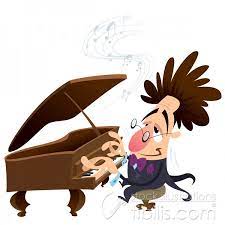We pianists have an advantage over other musicians. We command a wide range of sonorities and, well, a wide range of pitches. It's no wonder then, that so many composers come from a keyboard background. I've always felt that piano students who explore composition have an added insight into the innards of music, giving them a leg up in the profession.
I'm happy to announce that an emerging pianostudent of mine, Carlos Gardels, is also an emerging composer of music for piano. (No, I don't teach composition.) He has recently published "Three Fantasies," available through Theodore Presser (Presser). Teachers who participate in festivals and competitions are always on the lookout for the "American" category or the "Modern" category. Have a look at these imaginative, lyrical excursions into "fantastical escapes from reality."
You can listen to the composer's demos here: Prelude, Cosmic Lullaby, Intermezzo









